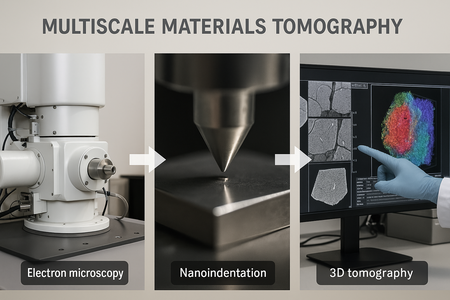
Modern materials research increasingly relies on a variety of experimental data sets that span multiple scales — from nanoscopic tomography to macroscopic mechanical testing. Especially when the correlation of different material properties is investigated, e.g., the relationship between microstructure and mechanical response of a material, a joint and efficient analysis of these diverse data sets is hindered by incompatible formats, missing metadata, or unstructured workflows. Materials Acceleration Platforms (MAPs), which demand high data fidelity and automation, are particularly constrained by these issues.
To address these challenges, this use case aims to develop a unified infrastructure that supports the collection, storage, integration, and analysis of large tomographic datasets and mechanical testing data obtained from a variety of methods. By aligning these data with shared ontologies and standardized workflows, researchers can achieve reproducibility, interoperability, and automated insight generation across methods and scales.
| Main requirements: - Tomography and mechanical data sets and their respective processing workflows from different sources. - A common metadata schema to incorporate all respective data sets. - Metadata store for high-volume experimental data |
| Main Task Area: TA-WLE Other related Task Areas: TA-SAI |
| Possible connections within NFDI: NFDI4Ing |
| Material/Data: - Tomographic datasets (e.g., APT, FIB-EBSD (Focused Ion Beam Electronic Backscatter Diffraction) or OM serial sectioning) - mechanical test data (e.g., high-throughput nanoindentation, micropillar compression testing data) |
| Main Success Scenario: An integrated infrastructure enables the analysis and fusion of multiscale, multimodal data sets (e.g., tomography + mechanical testing) from a single material sample. Researchers can navigate between both local and global microstructural data and their correlation to mechanical properties of the sample. |
| Added value for the MatWerk community: This integrated infrastructure bridges multiple length scales for experimental data across multiple scales and modalities, enabling a deeper understanding of material behavior and its dependency on microstructure. By promoting FAIR data practices and standardized workflows, it ensures long-term accessibility, reusability, and reproducibility of complex datasets. The approach also fosters lab integration and workflow automation within the MatWerk community. |
Case studies include the multiscale analysis of additively manufactured alloys, where atom probe tomography (APT), electron backscatter diffraction (EBSD), and optical microscopy (OM) serial sectioning, as well as high-throughput nanoindentation data are combined to explore the relationship between microstructure and mechanical properties. Another case involves the microstructural correlation of creep behavior in high-temperature alloys through the fusion of FIB-EBSD orientation maps with localized nanoindentation creep data, A further example investigates the mechanisms of failure in multiphase materials, where FIB-SEM tomography allows to localize the onset of plastic deformation in micropillars that contain stress concentrators like precipitates or weak phase boundaries. These case studies demonstrate how fused tomographic and mechanical data can support the fabrication and qualification of advanced materials, emphasizing the infrastructure’s strength in handling complex, multimodal datasets across diverse research domains.
NFDI-MatWerk
Funded by the Deutsche Forschungsgemeinschaft (DFG, German Research Foundation) under the National Research Data Infrastructure – NFDI 38/1 – project number 460247524.
NFDI-MatWerk
Funded by the Deutsche Forschungsgemeinschaft (DFG, German Research Foundation) under the National Research Data Infrastructure – NFDI 38/1 – project number 460247524.
Subscribe to our newsletter for regular updates about materials science topics!
After subscribing, you will receive an email from us with a confirmation
link.
Only after clicking this link your registration is completed.